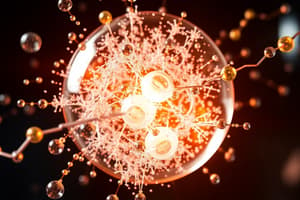Podcast
Questions and Answers
What is the minimum energy required for colliding particles to react?
What is the minimum energy required for colliding particles to react?
- Activation energy (correct)
- Kinetic energy
- Potential energy
- Surface energy
Which of the following increases the rate of a chemical reaction?
Which of the following increases the rate of a chemical reaction?
- Lowering the concentration of reactants
- Using a catalyst (correct)
- Increasing the particle size
- Decreasing the temperature
What is the term for an unstable arrangement of atoms that forms for a moment at the peak of the activation-energy barrier?
What is the term for an unstable arrangement of atoms that forms for a moment at the peak of the activation-energy barrier?
- Reaction intermediate
- Transition state
- Catalyst complex
- Activated complex (correct)
What is the purpose of grinding a solid into a fine powder?
What is the purpose of grinding a solid into a fine powder?
What is the term for a substance that slows down a chemical reaction?
What is the term for a substance that slows down a chemical reaction?
What is the rate of a reaction dependent on in a first-order reaction?
What is the rate of a reaction dependent on in a first-order reaction?
What is the sum of the exponents for the individual reactants in a reaction rate law?
What is the sum of the exponents for the individual reactants in a reaction rate law?
What is the role of the slowest step in a reaction mechanism?
What is the role of the slowest step in a reaction mechanism?
What is the specific rate constant, k, in a rate law?
What is the specific rate constant, k, in a rate law?
What is an intermediate in a reaction mechanism?
What is an intermediate in a reaction mechanism?
Flashcards are hidden until you start studying
Study Notes
Chemical Reaction Rates
- A rate measures how much something changes within a specified amount of time.
- In chemistry, the rate of a chemical reaction (reaction rate) is expressed as the change in the amount of reactant or product per unit time.
Collision Theory
- Atoms, ions, and molecules react to form products when they collide if they have enough kinetic energy.
- The minimum energy required for colliding particles to react is called the activation energy.
- An activated complex (or transition state) is an unstable arrangement of atoms that forms briefly at the peak of the activation-energy barrier.
Factors Affecting Reaction Rates
- Temperature: raising the temperature usually increases the reaction rate, while lowering it slows it down.
- Concentration: increasing the concentration of reactants increases the frequency of collisions, leading to a higher reaction rate.
- Particle size: smaller particles have a greater surface area, increasing the reaction rate.
- Catalysts: substances that increase the reaction rate without being used up during the reaction, permitting reactions to proceed along a lower energy path.
Rate Laws
- The rate at which A forms B can be expressed as the change in A with time.
- The rate law is an expression for the rate of a reaction in terms of the concentration of reactants.
- The specific rate constant (k) in a rate law is large if products form quickly and small if they form slowly.
Reaction Orders
- A first-order reaction is one in which the rate is directly proportional to the concentration of only one reactant.
- The overall order of a reaction is the sum of the exponents for the individual reactants.
Reaction Mechanisms
- An elementary reaction is a reaction in which reactants are converted to products in a single step.
- The series of elementary reactions or steps that take place during a complex reaction is called a reaction mechanism.
- An intermediate is a product of one step in a reaction mechanism and a reactant in the next step.
- The slowest step determines the rate of the overall reaction.
Studying That Suits You
Use AI to generate personalized quizzes and flashcards to suit your learning preferences.



